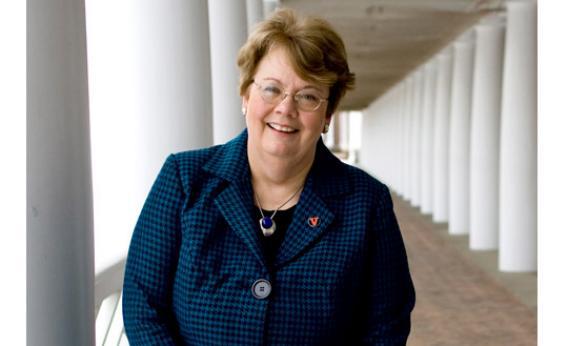University of Virginia president Teresa Sullivan would have officially stepped down Wednesday had an outraged community of faculty members, students, and administrators not pressured the Board of Visitors to reinstate her. On Slate, Siva Vaidhyanathan has already sketched the corporate myopia that may have motivated the ouster—not to mention the silence that screened and mystified it. Now, Sullivan and her supposed nemesis, Helen Dragas, are reconciled and poised to lead the school together, president and rector. I’m glad Sullivan got her happy ending, but I have some reservations about the way she’s framing her 18-day trial.
The Washington Post published an interview with UVA’s once and future president Wednesday morning. It’s worth a listen (though at 70 minutes, you may want to get comfortable first). Sullivan tries to extract lessons from her horrible experience: “Maybe … I misjudged and I should have asked to have a hearing and a public vote,” she says. She’s also said she regrets not “[communicating] more frequently with the members of the board” that sought her removal. But the board had praised her leadership in a recent meeting; plus, once you’re informed that 15 out of 16 trustees want you gone, demanding a hearing and a public vote starts to seem both petulant and unnecessarily humiliating. I have trouble imagining what Sullivan could have done differently as the scandal took off.
Certainly, there are lessons to be learned here—about transparency, the possibly too-privileged role of boards, and the obligation to seek input from faculty members in university-wide decisions—but not by Sullivan. Like recent events at Penn State, the upheaval at UVA suggests that schools could benefit from an overhaul to the way they circulate knowledge, particularly criticism or bad news. And maybe another conversation is waiting to happen about the societal role of universities in the future, vis-à-vis online course offerings and other technological advances. (The board was initially dismayed by Sullivan’s “incremental approach to change.” It turns out that the updates they wanted were taking place anyway.)
But Sullivan’s efforts to take partial responsibility for what happened to her puzzled and saddened me. She was blindsided and embarrassed, it was a mistake, and now she’s back. The gesture is lovely, but she has no obligation to turn her victimization into a springboard for self-improvement.
“Sweet are the uses of adversity, which like the toad, ugly and venomous, wears yet a precious jewel,” Sullivan told reporters, citing Shakespeare. The line refers to toadstones: magical, curative gems once believed to grow in the amphibians’ foreheads. To a 21st-century reader, those “brain jewels” signify knowledge gleaned from experience—at least, that’s how Sullivan seems to be using the quote, saying of her ordeal, “I just hope that I learned the right lessons.” Admirable, again, but unnecessary. The toads of life don’t always need a reason to hop into your path. President Sullivan, it’s fine with us if you leave the soul-searching to the Board of Visitors and get back to being great at your job.
